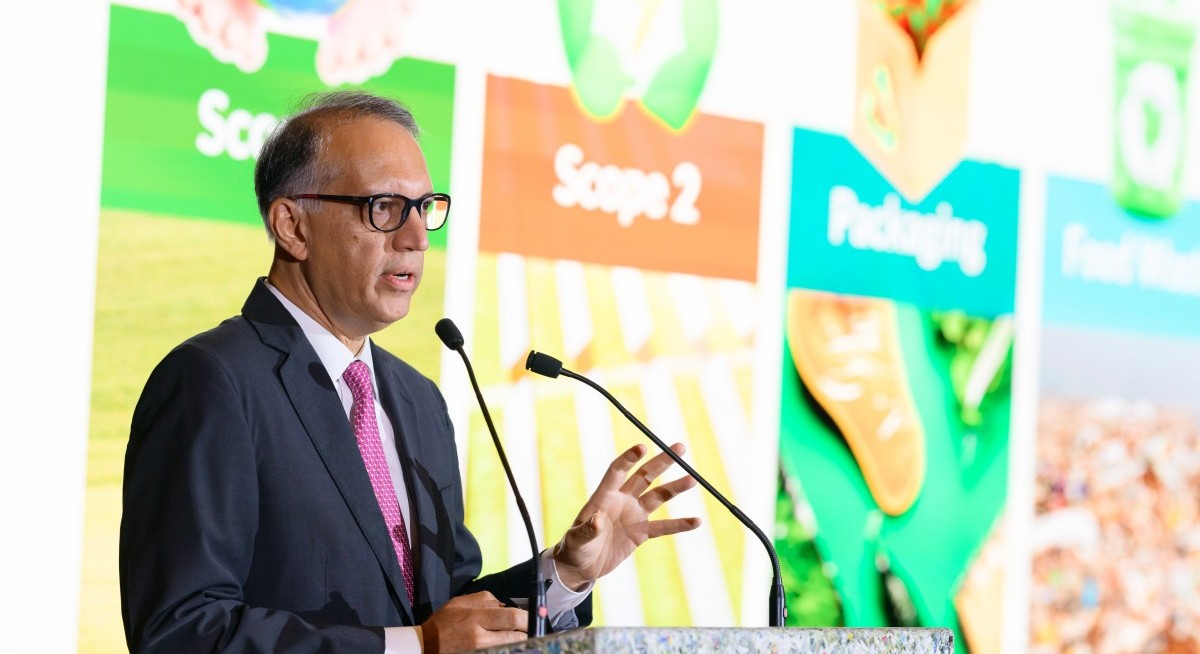Sustainability at the supermarket goes far beyond charging 5 cents for every plastic bag used at the checkout counter. According to Vipul Chawla, group CEO of Fairprice Group, the homegrown supermarket chain learnt from European stores to design cold storage spaces directly behind chillers.
Shoppers may be none the wiser, but behind rows of refrigerators filled with tubs of ice cream and cartons of milk are “back chillers” where staff can restock products with ease. According to Chawla, this redesign cut electricity consumption by 40%.
In 2024, FairPrice installed “green refrigerants” for five new stores, which it claims cut 3,000 tonnes of carbon dioxide equivalent (tCO2e).
According to FairPrice’s website, these CO2 refrigerants have lower global warming potential (GWP 1) than conventional refrigerants like hydrofluorocarbons (HFCs) and chlorofluorocarbons (CFCs), which can have GWPs “ranging from hundreds to thousands”.
In total, 14 stores have been fitted with “energy-efficient and low-emission” refrigerants to date.
The FairPrice Group is not listed and is not required to issue sustainability reports. Still, it has voluntarily disclosed its sustainability efforts for 10 years running.
In its 2024 report, published on May 9, FairPrice acknowledged that emissions from its refrigerants rose from 75.4 kilotonnes of carbon dioxide equivalent (ktCO2e) in 2023 to 88.8 ktCO2e in 2024.
The group attributes the increase to “leakage from concealed pipes in older stores”. “[FairPrice Group] is collaborating with a refrigerant systems expert to review our leak management system and further mitigate future leakages.”
In August 2023, FairPrice announced its goals to achieve operational net-zero greenhouse gas emissions in Scope 1 and Scope 2 by 2045, first with a near-term target to halve Scope 1 and 2 emissions by 2030.
See also: Corporate governance advocate Mak Yuen Teen launches new body to raise board standards
This takes into account more than just NTUC FairPrice’s supermarket operations; the FairPrice Group also comprises Kopitiam, Cheers, NTUC Foodfare and NTUC Link, among others.
With improvements in data-gathering, FairPrice discovered in 2024 that its initial emissions baseline — fixed at 2021 — was “underestimated due to data collection challenges and missing data points”.
“In particular, the manual collection of refrigerant consumption data from multiple vendors introduced inconsistencies and underreporting. Tracking electricity consumption across more than 400 locations was also challenging, given the reliance on manual processes and varying invoice arrangements. As a result, the 2021 emissions footprint did not fully reflect our operational impact.”
Hence, FairPrice has decided to update its base year to 2023, and emissions data for that year have been verified. “This change in base year will provide greater confidence in the veracity of FairPrice Group’s emission data,” reads its sustainability report, with no change to its 2030 and 2045 goals.
But 2024 emissions were 6.3% higher y-o-y, and the group has its work cut out for it over the next five years. To halve Scope 1 and 2 emissions by 2030 against a 2023 baseline, FairPrice must bring 2024’s figure of 192.8 ktCO2e below 90.7 ktCO2e by the end of the decade.
‘Most sustainable store’
FairPrice opened its “most sustainable” supermarket outlet in August 2024 at City Square Mall, projecting that the 24,000 sq ft space will have a 30% lower operational carbon footprint than the average FairPrice supermarket in Singapore.
To stay ahead of Singapore and the region’s corporate and economic trends, click here for Latest Section
The overhauled outlet, which was first opened in September 2009, is lit entirely by LED, consuming half the energy of fluorescent lights. Its shopping carts and trolleys are also made with recycled plastics, according to FairPrice, and “sustainably produced fittings” — including server counter worktops, dining table tops, seats and other carpentry fixtures — are made from “recycled or sustainably produced natural materials”.
The City Square Mall outlet is a zero-food waste store; customers are encouraged to segregate their food waste on-site for treatment by the mall’s food digester.
Blemished produce, such as fresh fruits and vegetables, will be sold at discounted prices through the group’s IMperfect Fellas programme or donated.
Potential food waste gets processed through City Square Mall’s food digester, diverting it away from Singapore’s landfills.
Speaking on a panel at the WWF Earth Summit 2025 on May 23, Chawla says the group has hosted 150 “teaching journeys” for students to learn how products and materials were sourced for the store.
FairPrice says the outlet is a supermarket in Singapore designed with in-store education to help shoppers make “everyday sustainable choices”. This was created in partnership with the World Wide Fund for Nature (WWF) Singapore as a sustainability knowledge partner.
“We put everything that we had learnt into that store,” says Chawla. “Learning from this, we’re taking this forward into the other stores that we are building as we go forward.




